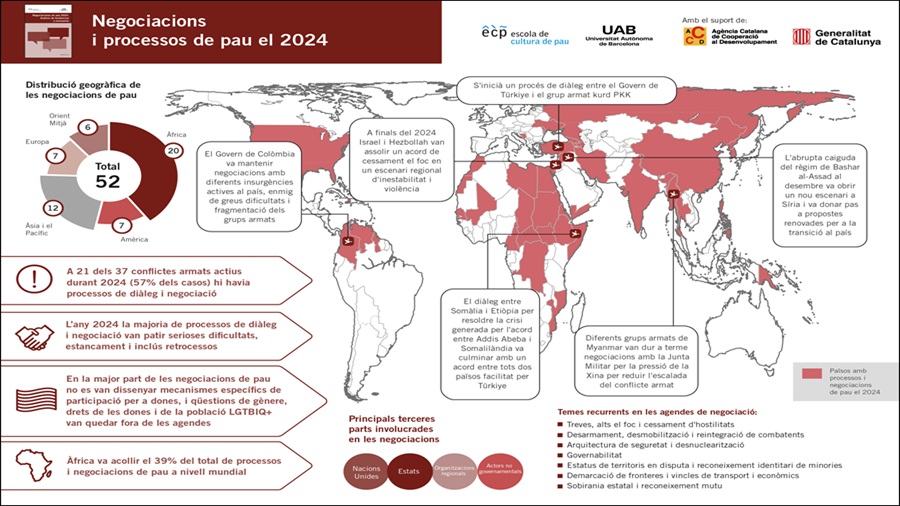A total of 52 peace processes and negotiations occurred globally in 2024
The Universitat Autònoma de Barcelona's School for a Culture of Peace (ECP) published a new report on the peacebuilding trends and scenarios occurring around the globe in 2024, in which the evolution of 52 contexts of armed conflict and political crises negotiations were analysed. The document, entitled "Peace Talks in Focus. Report on Trends and Scenarios", looks at the increasing challenges faced by peace diplomacies, as well as the talk initiatives promoted by the different regions.

According to the report, there has been an increase in the number of peace processes and negotiations analysed worldwide: seven more than in the previous year. In total, 52 peace processes were recorded. Of these, 20 took place in Africa, 12 in Asia and the Pacific, 7 in Europe, 7 in the Americas and 6 in the Middle East. For yet another year, Africa continues to be the continent with the highest number of negotiations recorded. The United Nations was present in 50% of the processes, confirming its position as one of the main players in mediation on a global scale.
This growth is part of an upward trend (37 processes in 2021, 39 in 2022 and 45 in 2023), and 2024 also exceeds the levels recorded in 2018 (49 cases) and 2019 (50). However, this increase has not translated into an overall improvement of the situation: 2024 was marked by an increase in the number of active armed conflicts (37) and by the intensification of violence in contexts such as Israel-Palestine, Cameroon, Ethiopia (Oromia), Sudan, Colombia, Haiti, Myanmar and Ukraine.
As in previous years, most of the peace processes encountered serious difficulties, such as stalemate, deadlock or lack of real political will on the part of the agents involved. In this regard, concerns remain about the lack of specific participation mechanisms for women and the absence of a gender perspective in most of the negotiations. Despite the active mobilisation of women's organisations and LGBTIQ+ collectives in many regions, these voices continue to be systematically excluded from formal spaces for dialogue.
A large part of the 2024 negotiation agendas focused on trying to reach truces, ceasefires and cessations of hostilities, particularly in conflicts such as Israel-Lebanon (Hezbollah), Colombia (ELN and EMC), Myanmar, Democratic Republic of Congo, South Sudan and Ethiopia. In many cases, diplomatic initiatives were led by third party state and regional agents, although in several contexts, such as Israel-Palestine or Haiti, attempts to stop the violence were insufficient or yielded only temporary results.
During 2024 there was, as usual, a combination of advances and setbacks. Among the most significant setbacks were the cases of Sudan, where the conflict between the army and paramilitary forces made no real progress; the persistent blockade in Myanmar and Palestine; and the fractured processes in Haiti, the Democratic Republic of Congo and Libya. In contrast, there were also relevant contacts, such as the maritime access agreement between Ethiopia and Somalia signed in Ankara, the reactivation of dialogue in Colombia with several armed groups, the ceasefire agreement between Israel and Hezbollah, or the border de-escalation between India and China.
On the occasion of the publication of the new report, UAB Rector Javier Lafuente stressed the importance of this work to understand the current international context: “This yearbook is a fundamental tool to have a careful radiography of the panorama of conflicts currently existing in the world and the resolutions processes implemented, and is a reference to understanding the scope of international reality, and the evolution of negotiations and peace dialogues that are being carried out”.
The complete publication and regional chapters can be consulted on the website of the School for a Culture of Peace.
The UAB, with Sustainable Development Goals
Peace, justice and strong institutions
Quality education